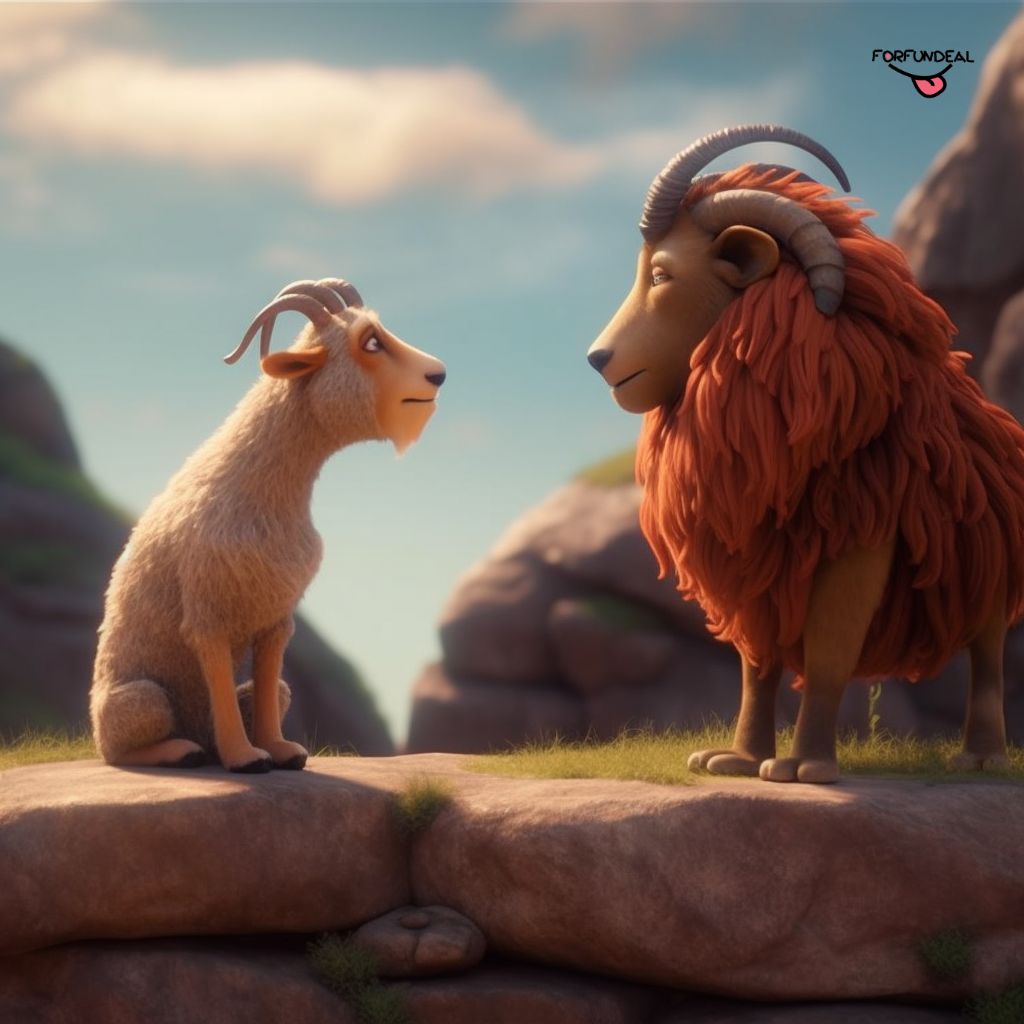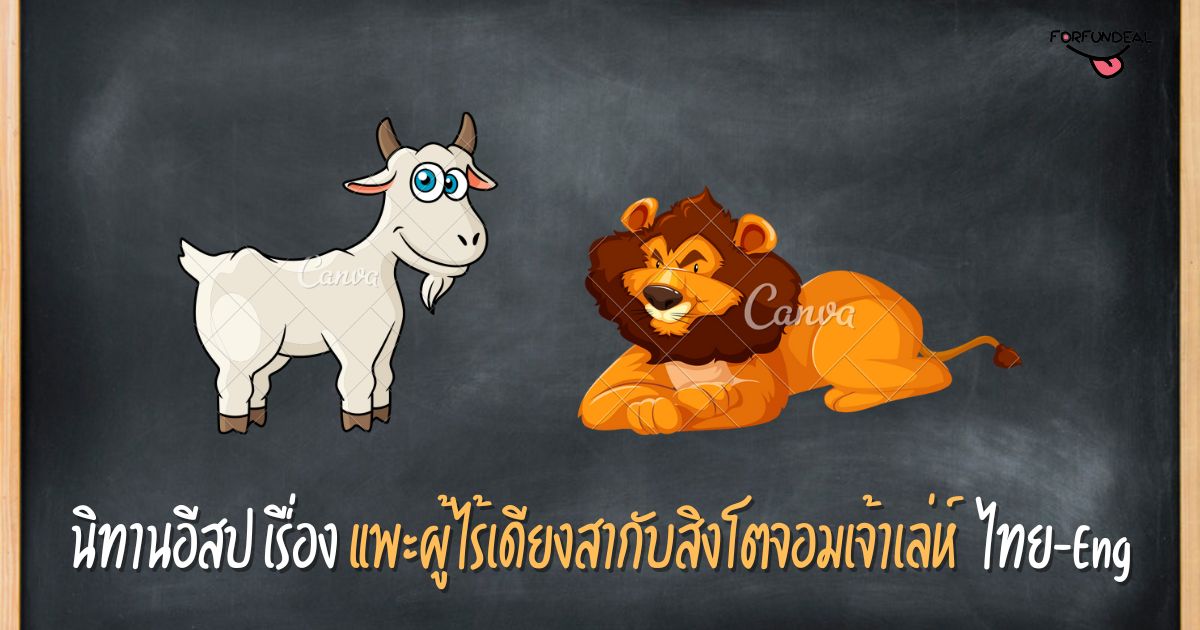“แพะผู้ไร้เดียงสากับสิงโตจอมเจ้าเล่ห์” เป็นนิทานอีสปที่เตือนใจกับการไว้ใจสิ่งต่างๆ โดยเชื่อแค่คำพูด โดยไม่คำนึงถึงข้ออื่นทั้งภายใน สัญชาตญาณของอีกฝ่าย
นิทานอีสปเรื่องแพะผู้ไร้เดียงสากับสิงโตจอมเจ้าเล่ห์
กาลครั้งหนึ่งนานมาแล้ว มีสิงโตและแพะอาศัยอยู่ในป่าเดียวกัน สิงโตซึ่งเป็นราชาแห่งป่าเห็นแพะเป็นเหยื่อของมัน อย่างไรก็ตาม แพะที่ฉลาดสามารถหลบเลี่ยงเงื้อมมือของสิงโตได้เสมอโดยการปีนขึ้นไปบนหน้าผาสูงชันที่สิงโตไม่สามารถเข้าถึงได้
Once upon a time, a lion and a goat lived in the same forest. The lion, being the king of the jungle, saw the goat as his prey. However, the clever goat always managed to evade the lion’s clutches by climbing up steep cliffs where the lion couldn’t reach.
อยู่มาวันหนึ่ง สิงโตตัดสินใจใช้ไหวพริบเพื่อชิงไหวชิงพริบแพะ เขาเข้าไปใกล้แพะและพูดว่า “เพื่อนเอ๋ย เรามาสงบศึกและเป็นเพื่อนกัน เราไม่จำเป็นต้องเป็นศัตรูกัน ข้าสัญญาว่าจะไม่ทำร้ายเจ้าอีกต่อไป”
One day, the lion decided to use his wit to outsmart the goat. He approached the goat and said, “My dear goat, let’s make peace and become friends. There’s no need for us to be enemies. I promise not to harm you anymore.”
แพะแม้ว่าจะไม่เชื่อ แต่ก็ตกลงตามข้อเสนอของสิงโตโดยหวังว่าจะอยู่ร่วมกันอย่างสันติ พวกเขาเริ่มใช้เวลาร่วมกัน ทานอาหารร่วมกัน และพูดคุยอย่างเป็นกันเอง แพะรู้สึกโล่งใจ คิดว่าสิงโตเปลี่ยนไปแล้วจริงๆ
The goat, though skeptical, agreed to the lion’s proposal, hoping for a peaceful coexistence. They started spending time together, sharing meals and engaging in friendly conversations. The goat felt relieved, thinking that the lion had truly changed.
วันหนึ่ง ขณะที่พวกเขากำลังเดินไปใกล้ขอบหน้าผา สิงโตเห็นหญ้าชุ่มฉ่ำอยู่ใต้หน้าผา มันหันไปหา แพะและพูดว่า “เพื่อนเอ๋ย ฉันแก่เกินไปและอ่อนแอเกินกว่าจะปีนลงมาได้ ขอหญ้าอร่อยๆ นั้นให้ฉันได้ไหม ฉันจะขอบคุณตลอดไป”
One day, as they were walking near the edge of a cliff, the lion spotted a juicy patch of grass just below the precipice. He turned to the goat and said, “My friend, I’m too old and weak to climb down. Could you please get that delicious grass for me? I would be forever grateful.”
แพะที่ไม่สงสัยต้องการรักษามิตรภาพที่เพิ่งพบจึงตกลงที่จะช่วย เมื่อแพะลงมาจากหน้าผา ธรรมชาติที่แท้จริงของสิงโตก็เปิดเผยออกมา สิงโตกระโจนเข้าใส่แพะพร้อมที่จะกินมัน
The unsuspecting goat, wanting to maintain their newfound friendship, agreed to help. As the goat descended the cliff, the lion’s true nature revealed itself. The lion pounced on the goat, ready to devour him.
ด้วยความพยายามที่จะเอาชีวิตให้รอด แพะจึงอ้อนวอนว่า “ได้โปรด ไว้ชีวิตข้าด้วย! จำมิตรภาพของเรา และคำสัญญาที่เจ้าให้ไว้”
In a desperate attempt to save himself, the goat pleaded, “Please, spare me! Remember our friendship and the promise you made.”
ราชสีห์ ความหิวครอบงำความรู้สึกภักดีใดๆ จึงตอบว่า “มิตรภาพไม่มีความหมายเมื่อพูดถึงการสนองความหิว เจ้าน่าจะรู้ดีกว่านี้”
The lion, his hunger overpowering any sense of loyalty, replied, “Friendship is meaningless when it comes to satisfying one’s hunger. You should have known better.”
แพะสำนึกผิดจึงคร่ำครวญถึงความใจง่ายของมัน มันเป็นบทเรียนที่เจ็บปวดที่ได้เรียนรู้ว่าไม่ใช่ทุกคนที่จะไว้ใจได้ แม้แต่สิ่งที่ดูเหมือนจะเปลี่ยนวิถีทางของพวกมันไปแล้ว
The goat, realizing his mistake, lamented his gullibility. It was a painful lesson learned that not everyone can be trusted, even those who seem to have changed their ways.

นิทานเรื่องนี้สอนให้รู้ว่า
“ควรระมัดระวังและไม่ไว้วางใจผู้ที่มีประวัติเจตนาร้ายโดยง่าย เนื่องจากลักษณะที่แท้จริงอาจไม่เปลี่ยนแปลงได้ง่ายนัก”
- การคิดอย่างมีวิจารณญาณ: เรื่องราวส่งเสริมการคิดอย่างมีวิจารณญาณและไม่คำนึงถึงสิ่งต่างๆ การตั้งคำถามและประเมินสถานการณ์และคำมั่นสัญญาเป็นสิ่งสำคัญ โดยเฉพาะอย่างยิ่งเมื่อมีประวัติความขัดแย้งหรือไม่ไว้วางใจ
- การสร้างสมดุลระหว่างความไว้วางใจและความกังขา: สอนถึงความสำคัญของการสร้างสมดุลระหว่างความไว้วางใจและความกังขา แม้ว่าความไว้วางใจเป็นสิ่งสำคัญสำหรับการสร้างความสัมพันธ์ แต่ควรสร้างขึ้นบนพื้นฐานของความสม่ำเสมอ ความซื่อสัตย์ และความรับผิดชอบ
- การเรียนรู้จากความผิดพลาด: ประสบการณ์ของแพะแสดงให้เห็นถึงคุณค่าของการเรียนรู้จากความผิดพลาดของตน การไว้วางใจสิงโต แม้ว่าจะมีการเปลี่ยนแปลงอย่างเห็นได้ชัด แต่ก็นำไปสู่ผลลัพธ์ที่เลวร้าย เรื่องราวกระตุ้นให้เราไตร่ตรองประสบการณ์ในอดีตและตัดสินใจอย่างชาญฉลาดในอนาคต
- การมองโลกในแง่ดีด้วยความระมัดระวัง: นิทานเรื่องนี้สนับสนุนการมองโลกในแง่ดีด้วยความระมัดระวัง เป็นเรื่องปกติที่จะเปิดรับการเปลี่ยนแปลงเชิงบวกในผู้คนแต่ไม่ต้องแลกกับความปลอดภัยหรือความเป็นอยู่ที่ดีของคุณ เราควรจัดการกับสถานการณ์ดังกล่าวด้วยการมองโลกในแง่ดีและประเมินความเสี่ยงที่เกี่ยวข้องตามความเป็นจริง
“One should be cautious and not easily trust those who have a history of harmful intentions, as true character may not change so easily.”
- Critical Thinking: The story encourages critical thinking and not taking things at face value. It’s important to question and evaluate situations and promises, especially when there’s a history of conflict or mistrust.
- Balancing Trust and Skepticism: It teaches the importance of striking a balance between trust and skepticism. While trust is crucial for building relationships, it should be built on a foundation of consistency, honesty, and accountability.
- Learning from Mistakes: The goat’s experience demonstrates the value of learning from one’s mistakes. Trusting the lion, even after apparent change, led to dire consequences. The story encourages us to reflect on past experiences and make wiser decisions in the future.
- Cautious Optimism: The tale advocates for cautious optimism. It’s okay to be open to positive change in people but not at the cost of your safety or well-being. We should approach such situations with a healthy dose of optimism and a realistic assessment of the risks involved.
โดยสรุปแล้วนิทานเรื่องนี้สอนให้เราระวังการไว้วางใจผู้อื่นเร็วเกินไป มองข้ามรูปลักษณ์ภายนอก และให้ความสำคัญกับการกระทำมากกว่าคำพูด ทำหน้าที่เป็นเครื่องเตือนใจว่าอุปนิสัยและความตั้งใจจริงถูกเปิดเผยผ่านพฤติกรรมที่สอดคล้องกัน และควรได้รับความไว้วางใจและไม่ปล่อยให้หลุดมือไปโดยง่าย
โดยการสะท้อนคำสอนของเรื่องราว เราสามารถเรียนรู้ที่จะแยกแยะในความสัมพันธ์ของเรา ตระหนักถึงการหลอกลวงที่อาจเกิดขึ้น และให้คุณค่ากับความซื่อสัตย์และการกระทำที่สอดคล้องกันในการประเมินลักษณะของใครบางคน

